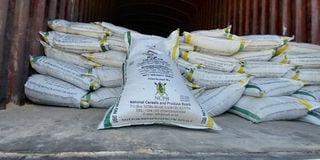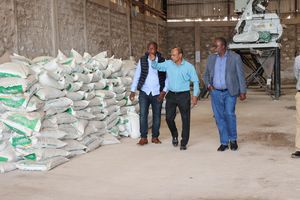
Some of the 560 bags of substandard fertiliser that were seized at the National Cereals and Produce Board depot in Molo, Nakuru County on March 23, 2024.
A company owned by Collins Kipchumba Ngetich, a brother of Aldai MP Marianne Kitany, is the better half in a partnership that has seen government close down operations of Thika-based Kel Chemicals, the Sunday Nation has established.
Mems Distributors Ltd, where Mr Ngetich is the majority shareholder, successfully bid for the supply and distribution of subsidised fertiliser alongside Kel Chemicals during the 2023/2024 financial year.
Mr Linturi’s supposed love affair with Ms Kitany has been the centre of numerous court battles over property, with the former consistently denying that he was ever married to her.
Ms Kitany’s divorce case was in 2021 dismissed after the High Court ruled that Mr Linturi was already legally married to another woman at the time the Aldai MP claimed that they were in a civil union. Ms Kitany and Mr Linturi are still fighting in civil courts over properties worth millions.
On Saturday, the Aldai MP insisted that she has no interests in Mems Distributors or any of its dealings, including government contracts that the firm has secured in the last two years.
In an interesting twist, Ms Kitany insisted that she will have no qualms investigating her own brother through the National Assembly's Public Investments Committee (PIC), where she sits.
The PIC is also investigating the alleged distribution of counterfeit fertiliser, and is expected to interrogate Kenya Bureau of Standards (Kebs) officials on Tuesday. The Committee is also expecting an investigation report from Auditor-General Nancy Gathungu at the end of April.

Agriculture CS Mithika Linturi (centre) and Senate Agriculture committee chairperson James Murango (right) on Thursday, April 11.
"I have no interests and also not aware of any of its dealings with any government entities. That (conflict of interest in awarding Mems Distributors a contract) is between CS Linturi and the directors of Mems. He (Mr Linturi) is a CS who took oath of office and is bound by that oath. He needs to answer that query. As a leader, I will exercise my role of oversight... The special audit is to be tabled before our committee end of April. And it covers not only operations at Kebs but also at the National Cereals and Produce Board (NCPB) and the ministry plus anyone else that will be implicated by the report," Ms Kitany told the Sunday Nation.
When asked about the potential conflict of interest in investigating Mr Ngetich, Ms Kitany indicated that she is in the PIC to represent the interests of Aldai residents and will throw her brother under the bus if found culpable for any wrongdoing.
“I do oversight as mandated by the people of Aldai. The fertiliser issue affects Aldaians whom I represent. And when anyone interferes with the interests of the public, they will respond accordingly to issues. Everyone must carry their own cross,” Ms Kitany added.
Mr Linturi's did not pick our calls to his known mobile phone number. He did not respond to our text and WhatsApp queries on whether he knew that a company owned by the brother of the MP who was supposedly his one-time lover was awarded a contract under his ministry. We also asked the CS whether he saw a possible conflict of interest in the contract award and whether he had declared this.
Mr Ngetich answered our call, but requested for two hours as he was not in a position to speak. He had not responded to further enquiries by the time of publishing this.
Documents that Mr Linturi submitted to the Senate’s Agriculture Committee on April 9, 2024 indicate that Mems Distributors and Kel Chemicals were jointly awarded a contract for the supply of 550,000 bags of fertiliser across the country.
While the two firms had a joint bid, only Kel Chemicals has been sanctioned as Mr Linturi on Friday ordered for closure of the Thika-based firm’s operations. Last Saturday, the CS suspended Kel Chemicals’ operations pending investigations.
The documents Mr Linturi submitted in the Senate indicate that Mr Ngetich’s Mems Distributors was also one of the firms contracted under the subsidy programme in the 2022/23 financial year.
Mr Ngetich found himself at the centre of the court battles, as his Barons Ltd sued Mr Linturi for allegedly forging his and Ms Kitany’s signatures to commit loan fraud. Barons Ltd claimed in court that it only agreed to guarantee Mr Linturi’s Atticon Ltd for a Sh50 million loan.
Mr Linturi, allegedly, forged signatures of Barons directors – Mr Ngetich and his mother Rhoda Kaitany – and used the papers to secure loans of Sh530 million. The court battles are ongoing.
On April 4, 2024 Kel Chemicals wrote to Mems Distributors stating that 3,000 bags of fertiliser manufactured on March 5, 2024 did not meet the required standard, that it had sent samples to the Kebs for further investigation and that corrective action had been taken immediately.
The errors, Kel Chemicals Chief Operating Officer Devesh Patel said, happened when the company’s general manager, operations had travelled home to attend his mother’s funeral.
“In total, we have recalled 2,100 bags, a balance of 900 bags will be collected. Kindly accept our apology for any inconvenience caused we assure (sic) of our continued cooperation and quality assurance. Thank you once again for give us (sic) the opportunity to supply you with our product,” Mr Patel said in the letter.
His letter suggests that Mems Distributors Ltd is the main player in the fertiliser deal, while Kel Chemicals’ presence is only on account of it being a manufacturer.
Mems Distributors has already found itself in the limelight for wrong reasons.
An audit team from the State Department of Public Works formed in September, 2023 found that Mems Distributors failed to properly service a contract for construction of classrooms in Kimilili Constituency.
The contract was under the National Government Constituency Development Fund (NGCDF) programme, where Mems Distributors was to build 18 good quality classrooms. But the firm instead built 16 classrooms. The audit team from the State Department of Public Works also found that the 16 classrooms were structurally unsound.
Curiously, Mems Distributors has been missing in all Ministry of Agriculture statements on the fertiliser saga, with the CS only pointing the finger at Kel Chemicals. Mr Linturi appeared before the Senate’s Agriculture Committee earlier this week, and submitted a written response to the lawmakers’ queries.
Mems Distributors Ltd was registered on July 16, 2013. Mr Ngetich owns 7,800 shares while Peter Odera Orwa owns 200 shares.
Kel Chemicals has, for over four decades been one of the biggest fertiliser manufacturers in the East African region despite changing hands three times.
On May 5, 2023 the Competition Authority of Kenya (CAK) approved the sale of Kel Chemicals by the Dawa Group to five reclusive entrepreneurs, after confirming that there was no anti-competitive act in play, and that the deal would not elicit negative public interest concerns.
With that regulatory approval, Jeetendra Kumar Somchand, Mahendra Kumar Somchand Haria, Pankaj Somchand Haria, Pradip Somchand Haria and Deveshkumar Bhupendrabhai Patel were handed the keys to one of Kenya’s oldest fertiliser producers.
While the CAK did not reveal the value of the transaction, it was definitely for a tidy sum. Approval from the competition regulator is only required when company takeovers involve a subject whose assets or turnover are in excess of Sh1 billion.
That was the third time that ownership of Kel Chemicals was changing hands.
Dawa Ltd, whose flagship business is in pharmaceutical manufacture, had acquired Kel Chemicals from its founders in 2015, as part of a revenue diversification move. The group had also tried its hand in real estate.
Just 10 months after the latest acquisition by the five entrepreneurs, Kel Chemicals is smack in the middle of controversy, but not for any reason that the CAK would ever have contemplated.
On Friday, embattled CS Linturi revealed that the government had temporarily withdrawn the firm’s licence, one week after he suspended trading of Kel Chemicals’ products following claims of it being substandard.
Kel Chemicals’ Kelphos Plus, Kelphos Gold and NPK 10:26:10 have been deemed, by the Kebs, to be below par, and risked wasting crops farmers have planted on thousands of acres across the country. The ban followed probe findings that 3,000 bags of fertiliser they produced had 24 percent of phosphorous instead of the recommended 26 percent.
This means that their products worth Sh10.5 million, going by the Sh3,500 retail price for each bag, could hamper their repayment of a Sh523 million loan.
Kel Chemicals borrowed Sh423 million in August, 2023 and used its Thika plant, with a capacity to produce 40 tonnes of fertiliser each day, as collateral for the loan.
In January 2024, the company borrowed a further Sh100 million. The timing of the loans indicate that firm was trying to finance the production of fertilisers under the Kenya Kwanza administration’s subsidy programme.
The firm has over the years distributed fertilisers in Kenya, Tanzania, Uganda, Democratic Republic of Congo, Rwanda, Burundi and Ethiopia. In Kenya, this was their second bite at the cherry, having secured a similar deal under President Uhuru Kenyatta’s regime.
The ban comes amid a storm over suspected distribution of substandard fertiliser, and possible cases of counterfeit products finding their way to farmers.
Some farmers have complained of receiving bags with stones, pebbles and stinking substances they suspect was manure. Investigations are yet to unravel the source of the fake inputs that found its way into the stores of the NCPB under the subsidy programme.
While Kel Chemicals is currently the only company that has suffered a ban, at least two other brands have been mentioned adversely in various investigations.
GPC Fertiliser, which is produced by SBL Innovate Manufacturers Ltd owned by Josiah Kariuki, has been flagged in recent weeks for selling soil disguised as fertiliser. Mr Kariuki has defended himself in an ongoing parliamentary probe and is also in the radar of the Directorate of Criminal Investigation.
Just like that, Kel Chemicals is in the lowest moment of its 47-year history. That low moment also comes with the risk of criminal investigation while the Kebs has also threatened to take legal action against it for allegedly distributing substandard products.
While Kel Chemicals’ owners are reclusive millionaires with little of a digital footprint, the Nation has established that they are not novices in doing business with Kenya’s government. The Haria family – Pankaj, Jeetendra, Pradip and Mahendra – hold a controlling stake with each of them owning 675,000 shares.
Kel Chemicals Chief Operating Officer Deveshkumar Bhupendrabhai Patel owns 300,000 shares in the company, making him a minority owner.
All shareholders double up as directors. The firm was incorporated on December 23, 1976.
The Haria family also owns Bahati Industries Ltd, which has in the past been prequalified to do works for at least two State institutions – Water Sector Trust Fund and National Oil Corporation of Kenya.
Here, Mahendra Haria is the majority owner with 450 shares, while Jeetendra Haria owns 50 shares. The duo doubles up as the company’s directors.
Bahati Industries was incorporated on February 15, 1988.

Silica Booster Limited (SBL) Innovative Manufacturers Director Josiah Kariuki addressing the National Assembly Committee on Agriculture and Livestock at the Parliament Buildings Nairobi on April 9, 2024.
Through Bahati Venture Ltd, the Haria family manufactures various plastic products and chemicals. The Embakasi-based company was incorporated on March 5, 1991. The National Environment Management Agency has licensed Bahati Venture Ltd to manufacture garbage liners.
For Mr Kariuki SBL Innovate Manufacturers Ltd, a company incorporated on August 22, 2022, was his first attempt to pull up a seat on the big table that is the manufacturing industry.
Six months before incorporating SBL Innovate, Mr Kariuki wrote to the NCPB through another company – 51 Capital – seeking to introduce a new brand of organic fertiliser made from silica, phosphorous, calcium, copper and nitrogen. He stated that the first 200 farmers to purchase his firm’s GPC fertiliser would receive a 10 percent discount.
In April, 2022 the NCPB entered into a partnership with Mr Kariuki’s 51 Capital for the distribution of GPC fertiliser.
Fast-forward to March, 2024 and the GPC brand is at the centre of an Africa Uncensored story detailing the distribution of counterfeit fertiliser.
Kebs has since stated that the GPC fertiliser was not the advertised organic product. But the Agriculture ministry has maintained that Kel Chemicals is the only firm that supplied products unfit for use on farms.
Along the way, Mr Kariuki’s SBL Innovate took over manufacture of the GPC brand in collaboration with Africa Diatomite Industries.
Mr Kariuki is the founder of Candy and Candy Records, a musical label that signed legends of old like Tanzania’s Mr Nice, Baby Madaha, Top C, Hussein Machozi and others, but failed to make a mark. He abandoned the music industry after the flop.
He was imprisoned in Tanzania between 2017 and 2019, with one year and seven months being a term for defrauding a Tanzanian businessman Sh13 million. The conviction was quashed in 2019 and he returned to Kenya.
On his return, Mr Kariuki tried his hand in the microfinance business with Palsunite Capital.
While his brands have not been adversely mentioned in the ongoing saga that has gripped the nation, Narendra Raval, one of the country’s most famous tycoons, also got into the fertiliser manufacturing industry when his National Cement Company completed a Sh5 billion buyout of rival ARM Cement in 2020.
ARM Cement owned Maisha Minerals & Fertilisers Ltd, and Mr Raval’s firm Devki Group inherited it in the takeover.
Mr Raval recently revealed that his group’s daily electricity bill is Sh100 million, an indication of the industrial juggernaut minting billions and keeping thousands of Kenyans in a job.
Narendra Raval owns 8,000 shares in the Maisha Minerals & Fertilisers, while Devang Raval owns 2,000 shares.










